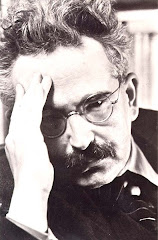In Greek, the word "trauma," means wound. And modern thought rightly understands a traumatic experience to be one which stays with us even after its occurrence and passage, just as a scar remains even after its aboriginal wound has healed. Yet there is something negative in our use of the word trauma, and by association, in our conception of the wound. It's as if the wound and the trauma that it leaves behind are things we'd like to avoid altogether. Initially and for the most part we believe that wounds are crippling. We do not realize that they are often what stirs us to walk.
For if the wound is that which cannot close, or which, upon closing, leaves a trace, a sign, a memory, in its place, is the wound not something necessary for our self-consciousness? For without a wound, that is, without a past, who are we? Without the wound of heritage, the wound of history, the wound of temporality, do we not become simply still-lifes in a stagnant, albeit beautiful painting? We would "be," if we can even use that verb, like a vibrantly painted pear that has no knowledge of the painting in which its presence is illuminated and no knowledge of its creator in whose absence its vitality is substantiated. Thus, the wound, opens us, in its opening, not to be the fruit that hangs in paintings and on trees, but to be the painters and pluckers of such fruit. The wound, the opening, out of which the inner "elements" flow, brings us out of hiding and into a "there," into a context. The wound is our pretext. Trauma is our pretext. The life-force that grounds us and is begrounded by us is not, then, dirt or clay, water or fire, or even energy, but trauma, understood as the wound.
Now, if in Christian theology, the wound of Christ, functions as a symbol of his selfless suffering which makes possible salvation, it becomes evident why such an image is powerful, moving, traumatic. The wound signifies all of the problems that accompany a state of post-Edenic falleness. The wound signifies suffering, evil, death. The wound of Christ is traumatic, not simply in its graphicness, but in its allusion to the primordial wound, the wound man supposedly caused to God when he disobeyed him and lied to him (evidenced by the line, "And the LORD called out, 'where are you?'") and the wound God assuredly caused to man, when he banished him. With the repetition of the wound in Christ, the underlying meaning is not salvation in the obvious, orthodox sense. For since Christ's death we do not live in Eden, we do not live in the garden of innocence so awesomely painted over the centuries. Christ's wound offers salvation not in a return to Eden, for Eden is a world free of wounds altogether, but salvation through being wounded, salvation through accepting memory, suffering, death, change. What it means to find salvation in Christ, then, is not to be transported into Eden, not even in regards to the soul. Rather, the salvation that the wounded God-man offers is one in which Eden becomes a wound of which we are proud, a wound on whose existence we depend for our being. Christ's acceptance of death, of the wound, offers us an opportunity to reject with joy any longing for eternity, immortality, concepts which exist only in the mindless world of the painting, and encourages us to find redemption in the wound in itself. We must become attuned to our wounds, and we must do so, never once and for all, but progressively and repeatedly. And we must do this not as despairing and troubled children "traumatized" by the wound, but as heroes "dramatized" by it, brought to life by it, "ekked" on by it.
Thursday, July 3, 2008
Subscribe to:
Post Comments (Atom)






No comments:
Post a Comment